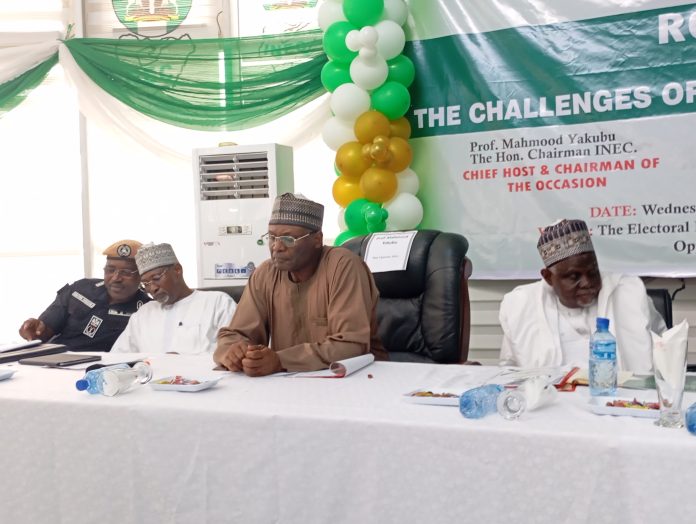Former Chairman of the Independent National Electoral Commission, INEC, Prof. Attahiru Jega, has warned that the growing trend of premature election campaigns in Nigeria undermines the integrity of the electoral process and could pose serious threats to elections if left unchecked.
Jega gave the warning in Abuja on Wednesday while delivering a keynote address at INEC Roundtable on “The Challenges of Premature Campaigns.”
He described early campaigning as an “undesirable aberration” that confers undue advantage on some candidates, fuels political tension, and entrenches a culture of lawlessness.
The former INEC Chairman noted that despite clear provisions in the Electoral Act 2022, which stipulates that campaigns must begin 150 days before polling and end 24 hours before voting, politicians, especially incumbents, routinely “jump the gun” through billboards, project commissioning, media promotions, and third-party campaign groups funded in violation of campaign finance laws.
“This spiral of illegalities erodes the rule-based system, creates an uneven playing field, and ultimately weakens public trust in elections,” Jega warned.
While citing examples from countries such as Australia, Mexico, and India, he urged Nigeria to adopt stricter definitions of premature campaigning, impose stiffer penalties, and ensure consistent enforcement by INEC, security agencies, and anti-graft bodies like the Economic and Financial Crimes Commission, EFCC and the Independent Corrupt Practices and Other Related Offences Commission, ICPC.
Jega recommended explicit definition of premature campaign offences and attaching severe penalties, as well as holding candidates and political parties liable for activities of third-party campaigners.
Other recommendations include monitoring campaign finance to include spending by surrogate groups and fast-tracking the establishment of an Electoral Offences Commission and Tribunal before 2027.
He also called on civil society organizations to play a stronger role in monitoring illicit political finance, and educating citizens to resist lawless political practices.
“With the prevalence of premature campaigns, Nigeria urgently needs reforms to protect the integrity of elections, nurture democratic culture, and guarantee a level playing field for all contenders,” Jega stated.
Earlier, INEC Chairman, Prof. Mahmood Yakubu, expressed concern over the alarming trend of premature election campaigns across Nigeria, warning that weak sanctions in the Electoral Act have made it difficult for the Commission to curb the practice.
Yakubu put the blame on political parties, candidates, and their supporters who are perpetually in campaign mode, sometimes years before elections are due.
He noted that despite Section 94(1) of the Electoral Act 2022, which prohibits campaigns earlier than 150 days before polling and ending 24 hours to election day, politicians routinely violate the law through rallies, outdoor advertising, and media promotions.
“These actions undermine the Commission’s ability to track campaign finance limits, as huge sums are expended long before the official commencement of campaigns,” he said.
Yakubu stressed that while Nigerians rightly expect INEC to sanction violators, the law itself presents a major obstacle.
“Section 94(2) of the Electoral Act provides only mild penalties, a maximum fine of N500,000, for campaigns within 24 hours to polling, but it prescribes no sanctions at all for campaigns earlier than 150 days to elections. Here lies the challenge,” he explained.
The INEC Chairman acknowledged that the problem of early campaigns was not new but had persisted due to weak enforcement mechanisms and legal gaps.
According to him, this is why INEC convened the forum to allow legislators, political party leaders, civil society, professional bodies, and regulators to brainstorm on solutions as the National Assembly reviews the electoral laws.
Yakubu lauded the participation of former INEC Chairman, Jega, who delivered the keynote address, alongside representatives of the Senate and House Committees on Electoral Matters, the Nigerian Bar Association, NBA, the Broadcasting Organisations of Nigeria, BON, the National Broadcasting Commission, NBC, and the Advertising Regulatory Council of Nigeria, ARCON.
“Protecting our electoral process and consolidating democracy is a multi-stakeholder responsibility. We are confident that today’s deliberations will yield actionable recommendations to strengthen our electoral framework and address the menace of premature campaigns.”
On his part, the National Chairman of the Inter-Party Advisory Council, IPAC, Yusuf Dantalle, stressed that stakeholders must work together to safeguard Nigeria’s democracy by ensuring free, fair, credible and inclusive elections.
Dantalle noted that political stability, enduring democracy, and prosperity depend on strict adherence to the rule of law and respect for electoral guidelines.
He warned that premature campaigns not only breach the Electoral Act but also create unfair advantages for some aspirants while undermining governance.
“It is inappropriate, unfair, illegal and undemocratic for politicians to disregard the laws regulating campaigns. When elected leaders use their offices for subtle or open electioneering long before the approved timetable, they distract themselves from their constitutional responsibilities,” he said.
He expressed concern that many incumbents exploit their positions to promote personal ambition rather than focus on governance.
According to him, this practice obstructs effective administration, deepens political tensions, and ultimately erodes public trust in the democratic process.
“The essence of constitutional rule is respect for rules, values, and ethics that sustain democracy. After more than two decades of uninterrupted democracy, we must strengthen our political culture rather than weaken it,” he added.
The IPAC Chairman called for renewed commitment to electoral integrity, noting that political parties must comply with Section 94 of the Electoral Act, which stipulates that campaigns commence 150 days before polling.
He emphasized that the proliferation of billboards, posters and rallies years before elections is a violation that must be stopped through firm action and collaboration between INEC, political parties, and other stakeholders.



